This entry is going to be dry... I just couldn't bear to write out my feelings without having committed the happenings to words. Anyway, here goes.
Presenting....
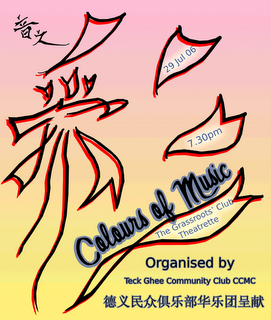
It was the night of pure magic. 《音之彩》 is the first full concert that my Chinese Orchestra has put up within her 16 years of existence. We had lots of performances, but never did we ever put up one that was of this magnitude and publicity. The concert was truly the performance that we could truly call as our own; most of the time, our performances were done on invitation by various grassroot organisations for the multitude of events that they host.
The many months of planning cumulated to this one night. This concert is significant for another reason other than the one I said; it is also a farewell concert for me by the orchestra. It is the concert before I fly off to the States for further studies. With that as a backdrop, my feelings are very mixed; on the one hand, I feel ecstatic that we are putting up a professional-level concert, on the other hand, I feel a deep sense of sadness as I realise that this will be the last time that I'd be jamming with my fellow orchestra members on such a scale at this point in time.
——

The stage is set. The instruments are arranged together with the chairs. Let not the appearance deceive you—all of the setting up is done by our members and not by any other crew members. This is surely the one thing that I will miss the most; the camaradarie of my fellow members and the great sense of mutual understanding between each other. Not to forget the amazing levels of cooperation that we can muster; there was never a time where any member had to do anything alone without any form of help. Us guys will help in the movement of the instruments from our practice room in the Community Club down to the lobby, then up the bus, before debussing and then moving them into place on stage, while the girls will help in moving all the miscelleanous items which they could manage. In fact, that is where I got my strength training from—by carrying heavy musical instruments like the 扬琴 and the 笙 up and down the many flights of stairs.
Usually, I feel adequately prepared for any of the performances that we put up, even if I need to put up a solo piece. But for some reason, my stomach was fluttering during the wait between the setting up to my appearance on stage. It wasn't hunger, neither was it outright fear; it seemed to be an amalgamation of anticipation and some slight apprehension of having to face a possible negative outcome. As I stood in the sidelines waiting for the members to file out to fill up their corresponding places, the fluttering grew in magnitude until I felt that my legs were somewhat wobbly.
The emcee went out from the wings and started the programme going. As she read the prepared script, I distracted myself by lovingly caressing my 笛子s, and telling them softly not to fail me at a critical time like this. That calmed my nerves somewhat, and the fluttering gave way to a warmth that slowly spread throughout my being. When the emcee went in and it was time for my appearance, I gave my 笛子s a final kiss and boldly stepped into the limelight, with 智琦 in front. 智琦 went up the conductor's podium while I stood at the soloist spot, preparing my 笛子 for the two solo pieces that I prepared.
On her cue, I started on 《姑苏行》.
——

《姑苏行》 was a piece meant to describe the scenery of 苏州 (Suzhou) through the eyes of a traveller on the way back home. It used the longer version of the 笛子 known as the 曲笛. With her cue, any remnants of my earlier unease went away as I focused my concentration on the emotive content of the piece. It starts off with a strong feeling of nostalgia, as the long and slow notes slowly piece together a certain fondness of the place as remembered by the traveller. The slow notes give way to a blossoming of sights before slowing down to allow the traveller to board the train. The train chugs on, pass the scenery, and with each closer movement towards his hometown, he gets more and more excited, until when the train stops and he gets off. He is at bliss; finally returning home, and he's just standing there, absorbing the scenery that he has missed for so long.
I bowed slightly at the polite applause from an appreciate audience. I bent and switched to my 梆笛, which is just a shorter version of the 笛子, in preparation for the next piece, 《牧民新歌》.
——
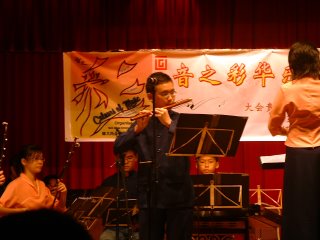
The nomadic horsemen of the Northern plains, that's what 《牧民新歌》 is all about. It starts with a Northern plain sunrise, a far-off subtle glow bathing the vast plains with virginal sunlight. As the sunlight gains intensity, the nomadic tribes stir, first with the horses, then slowly the horsemen themselves. As the morning slowly creeps in, the horsemen start their early morning song to wake the day up. The song is full of the carefree life that they lead, and is full of the vim that they possess. After awaking completely, the horsemen mount their steeds for a canter on the plains. The canter starts of slowly, and slowly reaches to a gallop. At this point, the nomadic horsemen are shown to their full glory; their pride as being nomadic horsemen and the pride that they have on their horses are fully captured in the strong and long notes at this point. The tempo increases and the focus is reshifted to that of the horses. At this point, the horses are running at a full gallop, neck to neck, as the horsemen ride faster and harder to outrace each other. The race gets very competitive, until one horse wins; it neighs in triumph and its horseman is full of pride that he has won. The rest pitter patter through and the nomadic horsemen congratulate each other of the race and the piece ends triumphant of the indomitable spirit of the nomadic Northern horsemen.
And thus ended my two solo pieces. The audience applauded, and I picked up my 笛子s and went back into the sidelines, while 智琦 took up her place behind her 杨琴.
——

The next piece is a very special one. It is a duet between my sifu (英成) and I. I've learnt most of my 笛子 skills from 英成, and it seems appropriate to have a duet with him on my farewell concert as a form of acknowledgement and gratitude for the years that he spent in teaching and training me to be the 笛子 player that I am today. 英成 is very liberal with his knowledge; he is willing to share with me the little insights that he has learnt through the hard way to help me avoid the same mistakes that he had made earlier. From initial reluctance due to me being very young, to the strong mutual understanding between he and I, we have indeed gone a long way. Upon reflection, I realise that I'd never had a proper duet with him before, and so, this seemed to be the perfect opportunity to showcase the camaraderie between my sifu and I.

《山乡晨曲》 is about the scenery of a village in the morning. The piece starts with the 曲笛 ushering in the misty sunrise into the village. The village stirs alive slowly, and slowly, the children's song and dance break out into the village. The vibrancy of the dance and song is highlighted by the 梆笛's shrill staccato notes. Towards the end, the flutter tongue and many staccato notes bring out the climax of the piece to its final conclusion.
And so ends my solo part of the concert. Once my sifu and I took a bow to the audience amid applause, we walked back into the wings. In the wings, euphoria set in as the pressure is off me now. On the way down the stage through the back door, 李老师 was there and he personally shook both 英成 and my hands and said that we did well!
And so, my 13 years of playing on the 笛子 has led to this. I'm glad.
——
The next part of the concert was on 智琦. She is the lead 杨琴 player of our orchestra. She plays an important role in our orchestra as the 杨琴 is a central instrument in the balance of the various sections. In most pieces, the 杨琴 is almost absolutely necessary as it is the Chinese Orchestra equivalent of a piano. In fact, 智琦 started her segment with a piece that showcases the 杨琴 as the Chinese piano.
《山丹丹花开红艳艳》 is a piece that describes the scenery of flowers in bloom. Amid the blooming flowers, it also subtly shows the various emotions evoked through the masterful application of various techniques of playing the 杨琴, some of which are not even used during mainstream playing, like plucking the strings with the reverse end of the 杨琴柱. 智琦 teased a resounding piano flavour out of the 杨琴, her strokes are delicate at the pianissimo portions, and are forceful at the forte parts. The impact of the force can only be described as explosive; coupled with the excellent sensitivity of the microphone, the illusion of the 杨琴 being the Chinese piano is complete. It was one of the most beautiful pieces that I'd ever heard her play; each stroke stirred very strong emotions within me, even though I was standing in the wings of the stage at that time.
As a way of showcasing her excellent ability in accompaniment, 智琦 was to accompany the three 中阮 players for their piece. The three players of the 中阮 were Luomin, Peijun and Xiuqing. The piece they played was 《引水上山坡》.
——
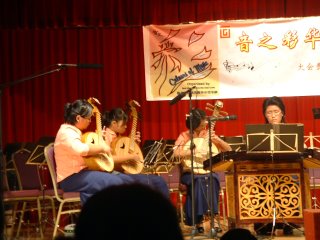
《引水上山坡》 is a piece on the collective efforts of a group of villagers who were trying to bring water up a hill. The 中阮 is a mellow instrument, which was great at simulating the huff and puff feeling of the villagers making their way up the hill. Coupled with strong strokes from 智琦's 杨琴, the illusion of a tough uphill climb becomes ever so real. The amazing thing about it all was that the three 中阮 players are all in their teenage, and yet they managed to play the piece with the gusto that it so desperately wants to be. It was a great first attempt by them, and I salute them.
The next piece up was 《赛马》, an 二胡 group piece. 智琦 was still playing the accompaniment, but this time, it was about 7 of the 二胡 players who came on stage to play.
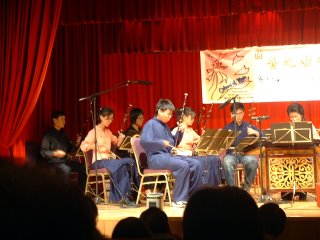
Leading the charge was Junyuan the "unstable". 《赛马》 is a piece that mimics the thrill and exhilaration of horse racing. The tempo is driven by the 杨琴, while the racing horses are from the 二胡 players themselves. Those of us in the wings were bracing ourselves for the cacophony that was to come; it always seemed to be the case as the level of ability of the players were different, spanning from those who just managed to master the piece, to those who were already fluent with it. Amazingly, the cacophony that we thought would ensue never came. The piece was played in the spirit that it was, and it was almost flawless.
With that, the first part of the concert ends. Phew...
After a brief reception with the VIPs during the intermission, it was on to the second half of the concert. The first to start was 李老师 with his 琵琶 solo, 《十面埋伏》.
——
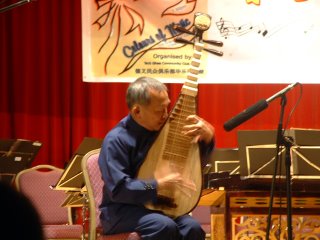
《十面埋伏》 is a piece that showcases the versatility of the 琵琶. It brings out the coyness of the instrument at one point, then at another, it shows a diametically opposite view, by demonstrating its machismo personality. 李老师 plays the 琵琶 in the exact way as how a chameleon changes its spots; it brings out very many different sides to the instrument. The piece describes the horrific sights and sounds associated to the battlefield, with fearsome sounds of battle everywhere, the sick rote drill of the marching drums, the sudden onslaught punctuated by quick snippets of rest stolen from the enemy. The 琵琶's versatility is stretched to its limits as the strings get strummed, plucked, and the body gets struck, rammed and jammed.
To an appreciative audience, 李老师 bowed, and it was on to the next segment; 沛秦's 二胡 solos.
——
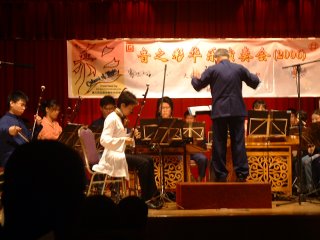
沛秦's solo pieces included 《二泉映月》 and 《豫北叙述回想曲》. Of the two, I only paid attention to 《二泉映月》 as it was the piece that I was involved in playing the 箫 in; there wasn't any woodwind parts in the second song.
《二泉映月》 is an emotive piece. It starts off with the 箫 leading in with a melancholous melody. The 箫, with its soft mellow voice, together with the long and simple notes, carried forth an air of resignation, almost like a sigh. The piece progresses into a form where it seemed that memories were being replayed. Then, as the music moves on, the memories get more and more recent, before climaxing to then end were the person feels that the future will not be as bleak as the past was, and walking off and futher away.
The end is near...
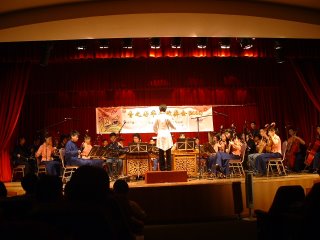
YES!!! Finally, something that we were all waiting for. The 大合奏 pieces. We presented two pieces that night, namely 《瑶族舞曲》 and 《乡音》. The energy level was slowly being built up at this point in time, with the end parts of both songs being played by the 梆笛, the saxophone and the 唢呐 at the same time!
Then the emcee screwed up...
We were supposed to have an encore piece entitled 《月圆花好》, but the emcee miscued and announced it to the audience. At that point, the energy level suddenly sky dived down to zero, as the surprise of the encore was totally lost. We were disappointed, and it showed as we weren't very coordinated in the piece.
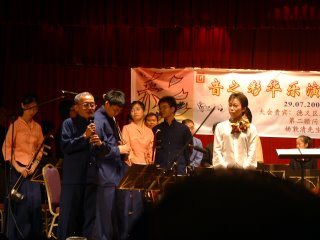
And after the piece was done, we all rose and 李老师 came on stage to say a few words about our performance. The audience, somewhat lethargic yet still showing polite enthusiasm, applauded and most seemed to be ready to get up and move.
I had to do something FAST.
I sneaked out of my position at the back of the orchestra all the way to the sidelines. As 李老师 and 沛秦 walked off the stage and the emcee returning to the wings, I crept out, gave a half-assed bow to a somewhat shocked crowd, and went up to the conductor's podium. I stood there, motionless.
By now, the audience seemed to have sensed that something was a little odd, as the orchestra was well seated and I was up on the podium posing with the conductor's baton in my left hand, all poised to spring forth.
Once I was sure everyone was ready, I leapt into action. It was the climatical end to 《瑶族舞曲》!
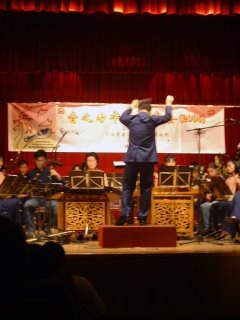
I conducted like a raving maniac, arms all waving, head bobbing, my body rocking to the quick tempo of the section. My fellow members released themselves from their shackles and joined in with wild abandon. They played faster, harder and with more relish than the first time through.
I did my bit and conducted them with huge exaggerated actions, to further increase their overall energy level. The orchestra obeyed, and the music simply roared! By the time we reached the final crescendo, I was already feeling very high, and it was obvious that my fellow orchestra members were feeling the same too. And we ended the impromptu encore on an extremely high note.
Thus done, I swivelled around and gave a bow to the stunned audience, who reacted with thunderous applause.
No comments:
Post a Comment